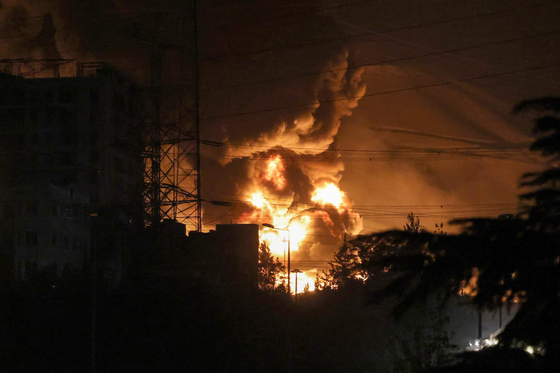Our Terms & Conditions | Our Privacy Policy
Korean companies brace for shock as oil prices rise over Israel-Iran conflict
A fire blazes in the oil depots of Shahran, Iran, on June 15. [AFP/YONHAP]
Global oil prices are soaring and Korean industries are bracing for impact after Israel launched airstrikes on Iran, jolting already fragile energy markets and raising the specter of a regional economic shock.
West Texas Intermediate (WTI) crude jumped 7.3 percent to $72.98 per barrel, marking the largest single-day increase since Russia’s invasion of Ukraine in 2022, according to the International Finance Center on Sunday.
The first wave of impact from the conflict has hit global oil prices, as Iran is the third-largest oil producer in the Organization of the Petroleum Exporting Countries (OPEC).
The Korea International Trade Association estimates that a 10 percent rise in energy prices due to escalating Middle East tensions would increase domestic production costs by 5.9 percent.
Korean refiners are on high alert.
While a short-term oil price hike could temporarily boost revenues, sustained increases will raise procurement costs and hurt margins over time.
Analysts warn that global oil demand — already weakened by the war in Ukraine and U.S. tariffs — could shrink further, particularly ahead of the peak summer season.
Korea’s petrochemical sector, already reeling from a supply glut from China, faces additional pressure.
If the price of naphtha, a key feedstock, rises in tandem with crude oil, production costs will climb.
“If demand were steady, we could pass on higher costs and improve profitability,” a local petrochemical industry source said. “But in the current market, we’re more likely to take a hit on cost.”
The airline industry also faces heavier burdens from pricier jet fuel.
Korean construction companies operating in the Middle East are keeping a close eye on the situation, as a wider regional conflict could delay projects, reduce orders or inflate raw material costs.
Adding to concerns is the Strait of Hormuz, a chokepoint for 20 percent of the world’s oil.
Korea depends on the strait for 60 percent of its Middle Eastern oil imports. JPMorgan has warned that a complete blockade could send prices soaring to $120 to $130 per barrel.
Shipping companies, including HMM, are reviewing alternative ports and routes in case of a closure. But analysts say that scenario remains unlikely.
“If Iran closes the Strait of Hormuz, not only the West but also China, Iran’s largest trading partner, would suffer,” said Yoo Kwang-ho, a senior researcher at the Korea Institute for International Economic Policy. “Unless the regime’s survival is at risk or full-scale war breaks out, Iran is unlikely to take that step.”
Translated from the JoongAng Ilbo using generative AI and edited by Korea JoongAng Daily staff.
BY KIM KI-HWAN [[email protected]]
Images are for reference only.Images and contents gathered automatic from google or 3rd party sources.All rights on the images and contents are with their legal original owners.



Comments are closed.